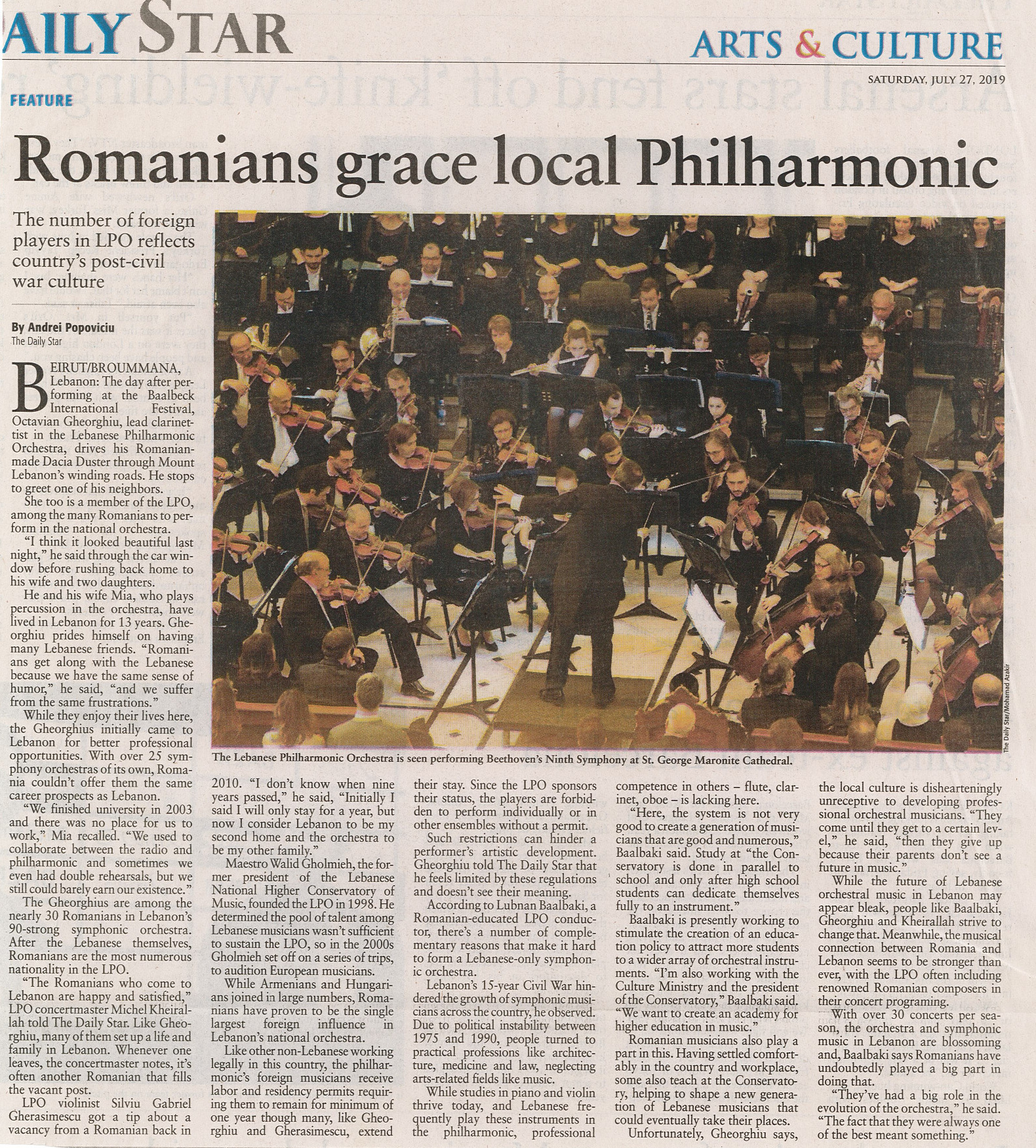Romanians grace local Philharmonic
A version of this article appeared in the web edition of The Daily Star on July 27, 2019.

BEIRUT/BROUMMANA, Lebanon: The day after performing at the Baalbeck International Festival, Octavian Gheorghiu, lead clarinettist in the Lebanese Philharmonic Orchestra, drives his Romanian-made Dacia Duster through Mount Lebanon’s winding roads. He stops to greet one of his neighbors.
She too is a member of the LPO, among the many Romanians to perform in the national orchestra.
“I think it looked beautiful last night,” he said through the car window before rushing back home to his wife and two daughters.
He and his wife Mia, who plays percussion in the orchestra, have lived in Lebanon for 13 years. Gheorghiu prides himself on having many Lebanese friends. “Romanians get along with the Lebanese because we have the same sense of humor,” he said, “and we suffer from the same frustrations.”
While they enjoy their lives here, the Gheorghius initially came to Lebanon for better professional opportunities. With over 25 symphony orchestras of its own, Romania couldn’t offer them the same career prospects as Lebanon.
“We finished university in 2003 and there was no place for us to work,” Mia recalled. “We used to collaborate between the radio and philharmonic and sometimes we even had double rehearsals, but we still could barely earn our existence.”
The Gheorghius are among the nearly 30 Romanians in Lebanon’s 90-strong symphonic orchestra. After the Lebanese themselves, Romanians are the most numerous nationalities in the LPO.
“The Romanians who come to Lebanon are happy and satisfied,” LPO concertmaster Michel Kheirallah told The Daily Star. Like Gheorghiu, many of them set up a life and family in Lebanon. Whenever one leaves, the concertmaster notes, it’s often another Romanian that fills the vacant post.
LPO violinist Silviu Gabriel Gherasimescu got a tip about a vacancy from a Romanian back in 2010. “I don’t know when nine years passed,” he said, “Initially I said I will only stay for a year, but now I consider Lebanon to be my second home and the orchestra to be my other family.”
Maestro Walid Gholmieh, the former president of the Lebanese National Higher Conservatory of Music, founded the LPO in 1998. He determined the pool of talent among Lebanese musicians wasn’t sufficient to sustain the LPO, so in the 2000s Gholmieh set off on a series of trips, to audition European musicians.
While Armenians and Hungarians joined in large numbers, Romanians have proven to be the single largest foreign influence in Lebanon’s national orchestra.
Like other non-Lebanese working legally in this country, the philharmonic’s foreign musicians receive labor and residency permits requiring them to remain for minimum of one year though many, like Gheorghiu and Gherasimescu, extend their stay. Since the LPO sponsors their status, the players are forbidden to perform individually or in other ensembles without a permit.
Such restrictions can hinder a performer’s artistic development. Gheorghiu told The Daily Star that he feels limited by these regulations and doesn’t see their meaning.
According to Lubnan Baalbaki, a Romanian-educated LPO conductor, there’s a number of complementary reasons that make it hard to form a Lebanese-only symphonic orchestra.
Lebanon’s 15-year Civil War hindered the growth of symphonic musicians across the country, he observed. Due to political instability between 1975 and 1990, people turned to practical professions like architecture, medicine and law, neglecting arts-related fields like music.
While studies in piano and violin thrive today, and Lebanese frequently play these instruments in the philharmonic, professional competence in others - flute, clarinet, oboe - is lacking here.
“Here, the system is not very good to create a generation of musicians that are good and numerous,” Baalbaki said. Study at “the Conservatory is done in parallel to school and only after high school students can dedicate themselves fully to an instrument.”
Baalbaki is presently working to stimulate the creation of an education policy to attract more students to a wider array of orchestral instruments. “I’m also working with the Culture Ministry and the president of the Conservatory,” Baalbaki said. “We want to create an academy for higher education in music.”
Romanian musicians also play a part in this. Having settled comfortably in the country and workplace, some also teach at the Conservatory, helping to shape a new generation of Lebanese musicians that could eventually take their places.
Unfortunately, Gheorghiu says, the local culture is dishearteningly unreceptive to developing professional orchestral musicians. “They come until they get to a certain level,” he said, “then they give up because their parents don’t see a future in music.”
While the future of Lebanese orchestral music in Lebanon may appear bleak, people like Baalbaki, Gheorghiu and Kheirallah strive to change that. Meanwhile, the musical connection between Romania and Lebanon seems to be stronger than ever, with the LPO often including renowned Romanian composers in their concert programing.
With over 30 concerts per season, the orchestra and symphonic music in Lebanon are blossoming and, Baalbaki says Romanians have undoubtedly played a big part in doing that.
“They’ve had a big role in the evolution of the orchestra,” he said. “The fact that they were always one of the best meant something.”
Post a comment